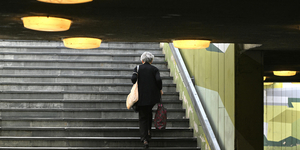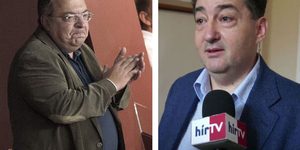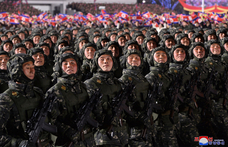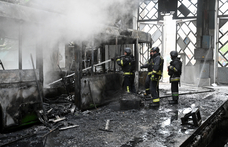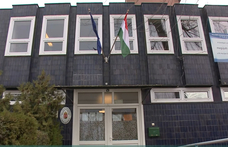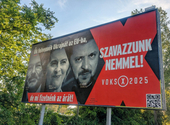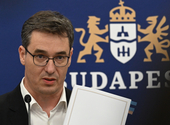 © Végel Dániel Gergényi |
In his response, Peter Gergenyi says the report does not deal in technical arguments but in cheap 'solutions'. Budapest's police chief claims the investigating committee sought only to prove a conclusion they had already reached. At the end of his letter, he cites an article from hvg.hu on the basis of which he accuses Istvan Ignacz, head of Pest County Police, of wanting his job. (The quote in question has since been removed from hvg.hu at Ignacz's request).
There was no way of dispersing the demonstration because it was not being held under the aegis of the law on public assembly, Gergenyi argues. The demonstration fell under the auspices of the electoral law, meaning that it was, in Gergenyi's view, "a spontaneous electoral rally," meaning the police had no legal means of putting an end to it.
The investigating committee has asserted that, given the slogans chanted by the crowed, the gathering clearly fell under the law on public assembly, meaning it would have been possible to break it up.
There were no parliamentary candidates on the scene, no manifesto was read, and no politician addressed the crowd. The demonstrators were there because of the Oszod speech, the committee argues.
In his letter, Gergenyi complains that the enquiry questions the administrative measures he took, despite the fact that the events were unexpected. He writes several times that it would have required "prophetic ability" to do what the committee says he should have done.
"Things were happening in seven locations, and if we had analysed the situation and worked out a detailed plan we would have been behind events, to say the least," Gergenyi writes. He also points the finger at Arpad Szabadfi, the deputy national police chief, pointing out that the officer was on the ground as events unfolded.
The committee's report questions why the police units before the parliament building were not moved to Szabadsag ter, where the TV siege was taking place. In his response, Gergenyi says police did not dare to weaken Parliament's defences in such a tense situation.
The report also says people leaving the TV building should have been asked for their identity cards, but that this did not happened. This, Gergenyi said, was because the first priority was to disperse the crowd. The committee asks why police units were separated from each other, but Gergenyi writes that the committee members appear to have forgotten about the angry crowd. He also writes that he was unaware that several police officers ordered up from Baranya county were not equipped with shields and helmets.
Gergenyi describes the events in front of the TV headquarters as "a state of war that the police had never seen before." The lackof tear gas and rubber bullets could also be explained by the sheer unexpectedness of the events, he writes. In its response to Gergenyi, the committee says there would have been time to deploy these tools.
Gergenyi said colleagues in other European countries had told him that the police response to the TV siege had been entirely appropriate.
The committee, which is headed by Ignacz, rejects Gergenyi's accusations of bias. They argue that the events that began to unfold on September 17 were not unexpected. They also write that Gergenyi was uncooperative when being questioned by the committee and seemed not to remember certain details. They consider it improper that no proper criminal investigation was launched and that no senior officer was sent to Szabadsag ter who could have coordinated the various police units.

